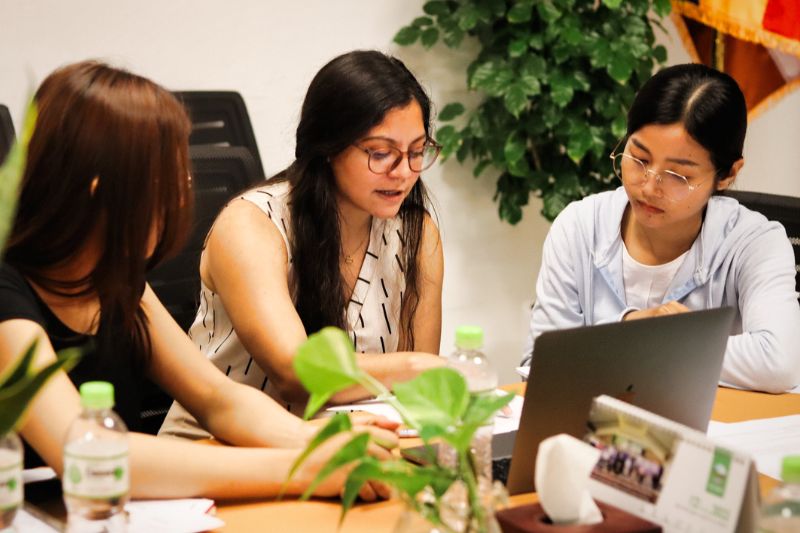
Dissemination of research results is a pathway to impact, and findings published in an English-language journal can reach a global audience. Publishing can be especially challenging, however, for researchers who aren’t fluent in English or are new to the peer-review process. A project funded by the Feed the Future Innovation Lab for Food Safety recently held a scientific writing workshop specifically designed to support Cambodian students in communicating their research.
“If your target audience is local, you can choose a journal that uses the local language, but the ones published in English have a broader audience, so publishing your article in a journal written in English provides you the opportunity to reach more people,” said Ellen Mendez, a Ph.D. candidate in the Department of Animal Sciences and Industry at Kansas State University. “It all depends on the objectives of the research and who you want to reach with the publication.”
The subject came up at the 2023 annual meeting of the International Association for Food Protection, where Mendez met with a group of Cambodian researchers collaborating on a Food Safety Innovation Lab project to strengthen produce safety in their home country.
“They were telling me that they were in the process of writing manuscripts, and that it was hard for them,” said Mendez. “Writing itself is difficult, but then to do it in a second language is even more difficult.”
The conversation inspired Mendez to propose a workshop on scientific writing for Cambodian researchers who aren’t fluent in English. Since 2019, the Food Safety Innovation Lab Cambodia project has offered a series of capacity-strengthening courses covering social science and gender research methods, statistics and whole genome sequencing. Mendez drew on her personal experience to develop the scientific writing course.
“English is also my second language,” said Mendez. “I’ve published some scientific manuscripts before, and I know that it’s not easy if you’re not familiar with it or if you don’t have someone who can help you.”
The course consisted of four sessions, three of them virtual and one held in person; roughly 20 students and researchers participated. Topics included how to write an abstract, structure a manuscript, add citations and references, and understand the peer review process, as well as how to create posters and other materials for presentations. The students were provided with resources to help with grammar, vocabulary, keyword searching and more.
“I think successful publication is one of the most rewarding achievements of my scientific pursuit,” said Malyheng Chhoeun, graduate research assistant at the Center of Excellence on Sustainable Agricultural Intensification and Nutrition, Royal University of Agriculture. “Once the team informed us that they were planning on conducting the scientific writing course, I was so excited for it. For young scientists and graduate students, this course helped us with professional writing skills and the process of submission and peer-review. We learned the step-by-step process from writing to publication and how to communicate findings to the reader.”
“I hope there will more courses and lectures like this for those in Cambodia who want to gain professional skills and to improve our ability to publish research for a wider audience,” she said.
Sokhom Panhavatey, a graduate student at the Institute of Technology of Cambodia, said she especially valued the chance to learn how to write manuscripts and create posters.
“I have a plan to publish my research in an international journal, but I didn’t know how to write a good manuscript or how to publish it,” she said. “After the course, I know how to do this. It was a fantastic class!”
Christina Frank is a freelance writer with the Feed the Future Innovation Lab for Food Safety. The Innovation Lab is one of a network of 20 such labs led by U.S. universities under Feed the Future, the U.S. government’s global hunger and food security initiative led by USAID.

